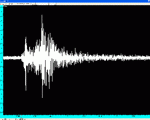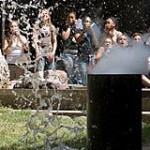Tag Geology
Rocks, crystals, fossils headline sale at Geology Museum
Unique gifts for people fascinated by the beauty of nature will be on sale at the University of Wisconsin–Madison Geology Museum for one day only, Friday, Dec. 4.
Banded rocks reveal early Earth conditions, changes
The strikingly banded rocks scattered across the upper Midwest and elsewhere throughout the world are actually ambassadors from the past, offering clues to the environment of the early Earth more than 2 billion years ago.
Looking for alien life at the ballpark
On Friday, June 5, UW–Madison researchers are taking science to the ballpark to share their work with the crowd at the Madison Mallards' first Friday night game of the season.
Project explores mechanics of major earthquake faults
CHICAGO - Deep-sea drilling into one of the most active earthquake zones on the planet is providing the first direct look at the geophysical fault properties underlying some of the world's largest earthquakes and tsunamis. The Nankai Trough Seismogenic Zone Experiment (NanTroSEIZE) is the first geologic study of the underwater subduction zone faults that give rise to the massive earthquakes known to seismologists as mega-thrust earthquakes.
Cave’s climate clues show ancient empires declined during dry spell
The decline of the Roman and Byzantine empires in the Eastern Mediterranean more than 1,400 years ago may have been driven by unfavorable climate changes.
Lava flows reveal clues to magnetic field reversals
Ancient lava flows are guiding a better understanding of what generates and controls the Earth's magnetic field - and what may drive it to occasionally reverse direction.
Comet dust reveals unexpected mixing of solar system
Chemical clues from a comet's halo are challenging common views about the history and evolution of the solar system and showing it may be more mixed-up than previously thought.
Ice Age lesson predicts a faster rise in sea level
If the lessons being learned by scientists about the demise of the last great North American ice sheet are correct, estimates of global sea level rise from a melting Greenland ice sheet may be seriously underestimated.
Ebb and flow of the sea drives world’s big extinction events
A new study, published online June 15 in the journal Nature, suggests that it is the ocean, and in particular the epic ebbs and flows of sea level and sediment over the course of geologic time, that is the primary cause of the world's periodic mass extinctions during the past 500 million years.
Ancient mineral shows early Earth climate tough on continents
A new analysis of ancient minerals called zircons suggests that a harsh climate may have scoured and possibly even destroyed the surface of the Earth's earliest continents.
Facility gives geology department new dimension
A geoscience visualization lab that opened last week in Weeks Hall will add a new dimension to geology research and education at the University of Wisconsin–Madison.
Recent sightings: Seismometer image of Midwest earthquake
A UW–Madison geology department seismometer in Weeks Hall recorded the tremors of an earthquake that shook Madison and many other areas…
UW Geology Museum receives more than $100,000 in minerals
In its 160-year existence, the University of Wisconsin–Madison Geology Museum has never before received a mineral donation like the one recently given by retired UW–Madison electrical engineering Professor R.A. Greiner.
Geology professor drills into earth-shaking questions
Two months aboard an ocean-going ship might sound like a luxurious vacation. With 16-hour workdays amid the clamorous hubbub of an industrial drilling rig, however, Harold Tobin’s recent voyage was far from relaxing. Tobin, an associate professor in the geology department, sailed last fall into the western Pacific in a quest to peer into the heart of one of the most active earthquake zones on the planet.
Arsenic contamination lacks one-size-fits-all remedy
Though a worldwide problem, arsenic contamination of drinking water does not have a universal solution, recent work by UW–Madison researchers has shown.
Deep-sea drilling expedition off Japan seeks earthquake, tsunami causes
Harold Tobin is interested in deep scientific questions, whose answers lie thousands of meters underwater. The UW–Madison geologist studies deep oceanic earthquake faults, which extend miles into the Earth’s crust below the seafloor, to learn what causes earthquakes and tsunamis.
Synthetic garnets made by Chancellor Wiley displayed at Geology Museum
In a small, freestanding case near the entrance of the University of Wisconsin–Madison Geology Museum, you might notice a familiar name next to two faintly yellow gems.
Recent sightings: Science learning with a big bang
A group of high school students from the univeristy’s Pre-college Enrichment Opportunity Program for Learning Excellence (PEOPLE) react to the big…













